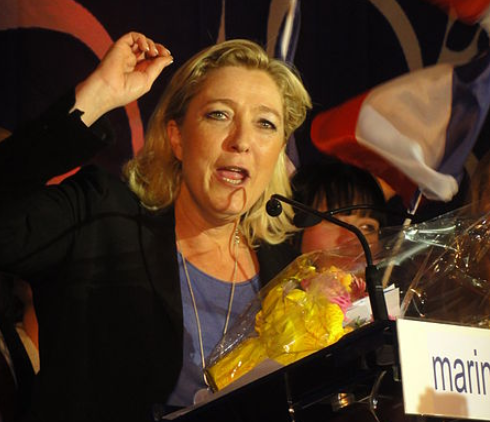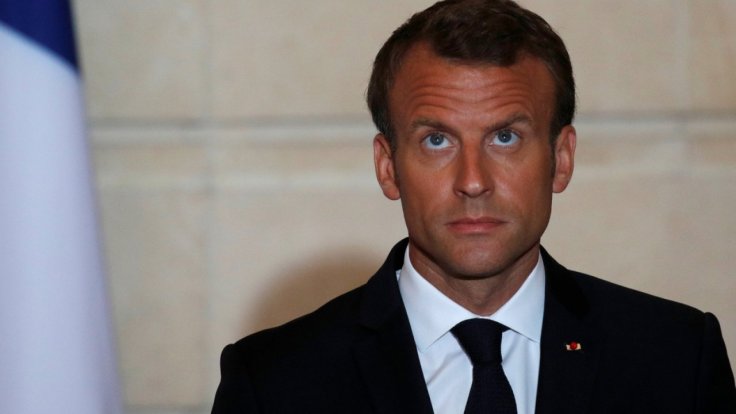Far-right leader Marine Le Pen is within striking distance of the French presidency after Sunday's voting saw her past the crowded field of 12 candidates. She will now face President Emmanuel Macron in a direct contest on April 24.
National Rally party leader Le Pen, the daughter of legendary far-right leader Jean-Marie Le Pen, has considerably improved her chances against Macron five years after she was trounced by him by a wide margin.
Though Le Pen narrowly edged far-left candidate Jean-Luc Mélenchon in the first round, opinion polls conducted immediately after the first round showed that Macron's lead against her is within the margin of error.

While Macron garnered 27.6 percent of votes in the first round, Le Pen secured 23.4 percent, narrowly ahead of Mélenchon, who ended possibly his last residential bid with 22 percent of the votes.
According to an Ifop-Fiducial poll, Macron is perilously placed with only a thin lead over Le Pen. The poll showed he would get 51 percent in the run-off compared with 49 percent for Le Pen.
Having come so close to Macron in opinion polls is a significant achievement for Le Pen and her National Rally Party. A few weeks ago, Le Pen was trailing Macron by more than 10 points.
How will Run-off Polls Play Out?
Ultra-right candidate Éric Zemmour, who secured 7.2 percent of the votes in the first round has asked his supporters to vote for Le Pen. Another candidate, Nicolas Dupont-Aignan, has also offered to support Le Pen. The Debout la France party leader has got just 2 percent vote in the first round.
However, a whole gamut of first-round contenders has called their supporters to vote against Le Pen. They include ultra-left candidate Jean-Luc Mélenchon, who got 22 percent of the votes and Valérie Pécresse, the Conservative leader who secured 4.8 percent of the vote. Other parties that would support Macron are the Socialist Party, French Communist Party, Europe Ecology and New Anticapitalist Party.

All these parties are united in their support of Macron only to fend off Le Pen from taking power in Paris. President Macron acknowledged this in a speech after the first round saying that some of the votes he would get in the run-off off will be merely anti-Le Pen votes.
If Macron retains his voe share and garners all the votes that Mélenchon, Pécresse and Yannick Jadot secured, he will be the president without much of a fight. The votes from all these blocs would be much more than 50 percent, handing him a comfortable victory.
However, the Ifop-Fiducial poll on Sunday suggests that the final bout will be more complicated.
The Times of the UK has given an interesting analysis that shows the path to the second term will be tough for Macron. The president got his 27 percent vote share even as, or by virtue of, the centre-right deserting their candidate Valérie Pécresse. Similarly, Socialist candidate Anne Hidalgo also was largely dumped by the voters. A significant number of votes from both these blocs have already gone to Macron, suggesting that he is hardpressed to gain more leverage in the upcoming run-off.
Here comes 22 percent of the votes garnered by the Far-Left candidate Melanchon. After the polls, Melanchon exhorted his supporters to vote for Macron. However, despite the fact that the far-left supporters are theoretically opposed to Le Pen's politics, not all those votes would be cast for Macron. The president's policies in the last five years have caused resentment among the working-class population, who traditionally vote for the far left.
Here's how BBC puts it in an analysis: "For President Macron, that makes it all the more urgent to secure votes from the left as well as from the centre-right. But five years on from his promise to combine both the centre-left and centre right in a new kind of politics, many left-wing voters are disillusioned with a man they've nicknamed "president of the rich".
With the electoral race tightly balanced, Macron will have the fight of his life to retain office. For Le Pen 2022 appears to be the best chance to win the French presidency. She has come a long way since 2013, when she renamed the National Front Party as National Rally, after taking over from her father, Jean-Marie Le Pen.








